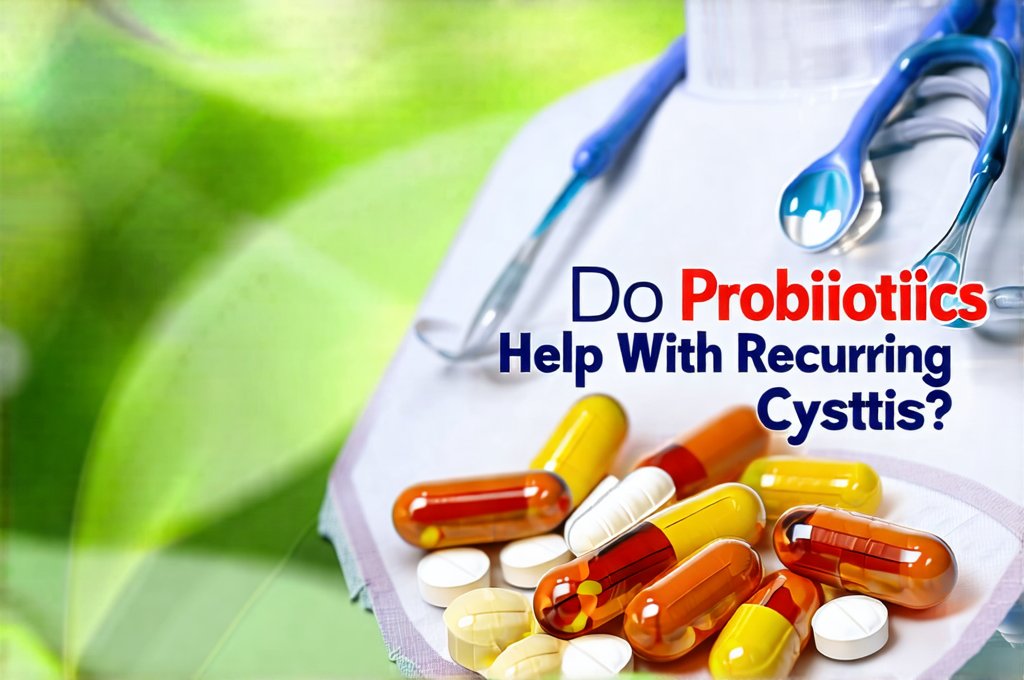Recurring cystitis is a frustrating and often debilitating condition for many women, characterized by inflammation of the bladder, leading to symptoms like frequent urination, urgency, pain, and sometimes blood in the urine. Conventional treatment typically involves antibiotics, but repeated courses can disrupt the natural gut microbiome, potentially contributing to antibiotic resistance and making future infections more difficult to treat. This has led many individuals to explore complementary approaches, particularly probiotics, as a preventative or adjunctive therapy. The rationale behind using probiotics stems from the connection between the gut microbiome, immune system function, and urogenital health – a complex interplay that’s increasingly recognized in medical research.
The potential for probiotics lies in their ability to restore and maintain a healthy balance of bacteria within the body. A disrupted microbiome can weaken the immune response, making individuals more susceptible to infections like cystitis. Specifically, certain probiotic strains have demonstrated in vitro and in vivo properties that suggest they can influence the urogenital environment, potentially preventing bacterial adherence to bladder walls and boosting local immunity. However, it’s crucial to understand that not all probiotics are created equal, and the effectiveness of these supplements varies significantly depending on the specific strains used, dosage, individual factors, and underlying health conditions. This article will delve into the science behind probiotic use for recurring cystitis, exploring what research currently tells us about their efficacy, which strains show promise, and important considerations for implementation.
Understanding the Gut-Bladder Connection & Probiotic Mechanisms
The relationship between gut health and bladder health isn’t as straightforward as it might seem, but is becoming increasingly understood through emerging research. The gut microbiome – the vast community of microorganisms residing in our digestive tract – plays a pivotal role in modulating immune function. Roughly 70-80% of the body’s immune cells are located in the gut, constantly interacting with bacteria and other microbes. A diverse and balanced gut microbiome strengthens these immune responses, enabling it to effectively combat pathogens. Conversely, dysbiosis (an imbalance in gut bacteria) can compromise immune defenses, increasing susceptibility to infections elsewhere in the body, including the urinary tract.
The connection extends beyond systemic immunity. The urogenital tract isn’t sterile; it also hosts its own microbiome. A healthy vaginal and bladder microbiome is dominated by Lactobacillus species, which produce lactic acid that maintains an acidic environment hostile to pathogenic bacteria like E. coli, a common cause of cystitis. Disruption of this urogenital microbiome – often due to antibiotic use or hormonal changes – can create opportunities for pathogens to colonize and cause infection. Probiotics, particularly those containing Lactobacillus strains, aim to restore the balance in both the gut and potentially the urogenital tract, enhancing immune function and creating an environment less favorable for harmful bacteria.
Furthermore, some probiotic strains have demonstrated the ability to:
– Produce bacteriocins: These are antimicrobial substances that specifically target and kill pathogenic bacteria.
– Compete with pathogens: Probiotics can compete with harmful bacteria for adhesion sites on bladder walls, preventing colonization.
– Enhance epithelial barrier function: Strengthening the lining of the urinary tract reduces permeability and prevents bacterial invasion.
– Modulate immune responses: Probiotics can stimulate the production of antibodies and other immune factors that fight off infection.
Current Research & Promising Strains for Cystitis Prevention
While research is ongoing, several studies have investigated the efficacy of probiotics in preventing recurrent cystitis. The results are mixed, highlighting the importance of strain specificity. Many early studies focused on broad-spectrum probiotic formulations with limited success. However, more recent investigations utilizing specific strains have yielded promising results. Lactobacillus rhamnosus GR-1 and Lactobacillus reuteri RC-14, often used in combination, are among the most extensively studied strains for this purpose. A landmark study published in 2018 demonstrated that daily supplementation with these two strains significantly reduced the recurrence rate of cystitis in women who had experienced frequent infections.
Other Lactobacillus species have also shown potential benefits. Lactobacillus crispatus, naturally abundant in a healthy vaginal microbiome, has been associated with lower rates of cystitis and improved urogenital health. Research suggests that supplementing with L. crispatus can help restore the vaginal microbiome after antibiotic use, reducing the risk of recurrent infections. Similarly, certain strains of Lactobacillus plantarum have demonstrated antimicrobial activity against E. coli and may offer protective benefits. It’s important to note that most studies examine prevention rather than treatment of acute cystitis; probiotics are generally not considered a substitute for antibiotics during an active infection.
However, the research landscape is still evolving. Many trials have been small or methodologically limited, making it difficult to draw definitive conclusions. More large-scale, well-designed studies are needed to confirm these findings and identify the most effective probiotic strains and dosages for different populations. Additionally, the impact of individual factors – such as age, hormonal status, diet, and underlying health conditions – on probiotic efficacy remains largely unexplored.
Factors Influencing Probiotic Effectiveness
The success of probiotics in preventing recurring cystitis isn’t just about choosing the right strain; several other factors play a crucial role:
- Dosage & Formulation: The amount of colony-forming units (CFUs) and the formulation (capsule, powder, etc.) can impact probiotic viability and effectiveness. Higher CFU counts aren’t always better; research suggests that 1–10 billion CFUs per day are often sufficient, but optimal dosage varies by strain. Look for products with a guaranteed CFU count throughout their shelf life.
- Delivery Method: The method of delivery – oral or vaginal suppository – can influence where the probiotics colonize. Oral supplementation primarily impacts the gut microbiome, while vaginal suppositories deliver probiotics directly to the urogenital tract, potentially offering more targeted benefits.
- Individual Microbiome Composition: An individual’s existing gut and urogenital microbiome significantly influences how well probiotics integrate and exert their effects. Prebiotic foods (discussed below) can help foster a favorable environment for probiotic colonization.
- Lifestyle Factors: Diet, stress levels, sleep quality, and immune function all impact the gut microbiome and overall health, influencing probiotic effectiveness. A diet rich in fiber and low in processed foods supports a healthy microbiome.
The Role of Prebiotics & Synbiotics
While probiotics introduce beneficial bacteria, prebiotics provide nourishment for those bacteria, helping them thrive. Prebiotics are non-digestible fibers found in foods like onions, garlic, bananas, asparagus, and oats. By consuming prebiotic-rich foods or supplements, you can create a more favorable environment for probiotic colonization and enhance their effectiveness.
Synbiotics combine probiotics and prebiotics into one formulation, offering a synergistic approach to gut health. This combination can potentially improve probiotic survival, adherence, and overall efficacy. Some research suggests that synbiotic formulations may be more effective than probiotics alone in preventing recurrent cystitis. For example, combining Lactobacillus strains with fructooligosaccharides (FOS), a common prebiotic fiber, has shown promising results in boosting immune function and reducing infection rates. If you are looking for ways to support your kidney health, consider researching do natural remedies help with kidney cancer.
Important Considerations & Cautions
Before starting any probiotic regimen, it’s crucial to consider the following:
- Consult your healthcare provider: Discussing probiotics with your doctor is essential, especially if you have underlying health conditions or are taking medications. Probiotics are generally considered safe for most people, but they may not be appropriate for individuals with compromised immune systems.
- Choose reputable brands: Look for products from well-established companies that conduct third-party testing to ensure product quality and accuracy of labeling.
- Start slowly and monitor your response: Begin with a low dose and gradually increase it as tolerated. Pay attention to any side effects, such as bloating or gas, and adjust the dosage accordingly.
- Be patient: It can take several weeks or months to see noticeable benefits from probiotics. Consistency is key.
- Probiotics are not a cure: They should be considered part of a holistic approach to cystitis prevention that includes lifestyle modifications, adequate hydration, and appropriate medical care. If you struggle with bladder pain, it might be helpful to explore do any bladder medications help with pelvic pain.
Ultimately, the use of probiotics for recurring cystitis holds promise as a complementary strategy, but more research is needed to fully understand their efficacy and optimize their application. By understanding the gut-bladder connection, choosing specific strains backed by scientific evidence, and considering individual factors, individuals can make informed decisions about incorporating probiotics into their preventative healthcare routine. If you are curious if do probiotics help rebuild bladder flora, check out this article for more information.





















